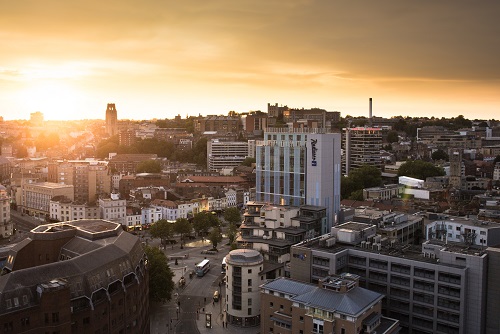
As 2017 draws to a close, we’re taking the opportunity to briefly reflect on the UK property market over the past 12 months and explore what might be in store for the year ahead.
Few would disagree that 2017 has been a challenging year for UK property; uncertainty in the market since the Brexit vote, a disastrous snap election result and inflation outstripping wage growth. However, despite this turbulence and many predictions of a ‘market crash’, the property market has weathered the storm and property prices have increased by around 5% since this time last year.
The market has experienced a slowdown, most notably in London, and it is predicted that this slowdown may spread outwards from the capital in the year ahead. However, with interest rates and unemployment both at record lows, and credit remaining accessible, it’s hard to envisage a property market crash.
With some rather gloomy headlines and bleak economic predictions for 2018 (many quoting facts that have been manipulated by the media), there is a danger of getting caught up in these statistics while ignoring the situation ‘on the ground’. And the fact is, the structural underpinnings of the UK property market point to continued steady growth in volume and prices in the medium to long term.
Whilst there are currently no predictions of a 2018 ‘property boom’, the good news is that an increase in the average UK house price is a realistic expectation for the year ahead, not a return to its former glory, but certainly a step in the right direction.
It’s suggested that the housing market is set to remain stable overall, although the number of people buying homes may fall slightly, according to forecasts released by the Royal Institution of Chartered Surveyors (RICS) and lender The Halifax.
The Halifax suggest an average annual rise in property values of up to 3% by the end of 2018, with price growth likely to be weakest in London and the South East. (1)
The Halifax report suggests that the reason for the muted outlook in 2018 is due to the continuing effects of this year’s squeeze on spending power and the uncertainty regarding the prospects for the UK economy next year. However, the report also states that, “There is little reason to expect any fundamental shift in the key housing market drivers in the immediate future”. (2)
Russell Quirk, chief executive of online estate agent eMoov, is also optimistic about the market in 2018: “UK house prices are up 5% since last December and we predict that they will continue to increase at a similar rate in 2018 as the market has already begun to find its feet again”. (3)
Both JLL and Savills are also predicting a positive, yet lower rate, rise in UK house prices next year, with an increase of 1% forecasted for 2018. (4) Similar predictions have been made by a Reuters poll, where 28 housing market specialists expect UK house prices to rise 1.3% in 2018. (5)
Hubb Property Group Managing Director, Oliver Hawthorne comments: “We can’t deny that the predicted outcome of Brexit from varied economists has impacted the property market over the course of 2017, but with the UK’s population still growing by an average of 0.7% (according to ONS) and life expectancy steadily increasing; there will always be an increasing demand for property. We’re predicting a positive year ahead with house prices in sought after areas such as Bath, Exeter and Manchester to rise by an average of 3%, whereas places such as London may not see a noticeable shift.
It’s also very clear that price performance in 2018 will very much depend on individual regions. For years, London property prices have outstripped the rest of the UK with house prices rising by over 70% in the last decade, but over the past 12 months, the capital has witnessed its first fall in house prices.
Savills predicts an average 2% fall in London property prices in 2018, followed by flat growth in 2019, while JLL predicts flat growth in 2018, followed by a 0.5% rise in 2019. (6) But not everywhere in the capital will suffer; a forecast by KPMG suggests that prices in Hackney may grow by more than 5% in the years to 2020, followed by Westminster and Lewisham, which will both experience growth of more than 4%. (7)
As always, it’s difficult to predict exactly what will happen, but perhaps for 2018 it is more difficult than in previous years.
It is likely that the economic uncertainty will continue, at least until the Brexit cloud is lifted, however with stable footings, the property market is likely to once again ride the storm. And with the inevitable changes ahead following the UK’s departure from the EU, we’ll all need to be able to react and adapt quickly as the year progresses.
If you’d like to find out more about our current investment opportunities with Hubb Property Group, starting from as little as £10,000, please get in touch for an initial chat on +44 (0)117 422 0122 or email enquiries@hubb.co.uk
Sources:
- http://www.mortgagesolutions.co.uk/news/2017/12/19/stable-modest-housing-market-expected-2018-halifax/
- https://www.express.co.uk/life-style/property/894547/house-prices-uk-latest-property-sales-up-north-continue-to-rise-2018
- http://www.moneyobserver.com/news/13-12-2017/which-way-will-property-prices-go-2018
- https://www.theguardian.com/business/2017/nov/02/uk-house-price-growth-to-halve-london-worst-hit-savills
- http://www.forexlive.com/news/!/reuters-poll-uk-house-prices-to-rise-13-in-2018-20171219
- http://www.cityam.com/277449/happen-house-prices-2018-heres-experts-think
- http://www.cityam.com/275105/every-london-borough-ranked-house-price-growth-next-three
